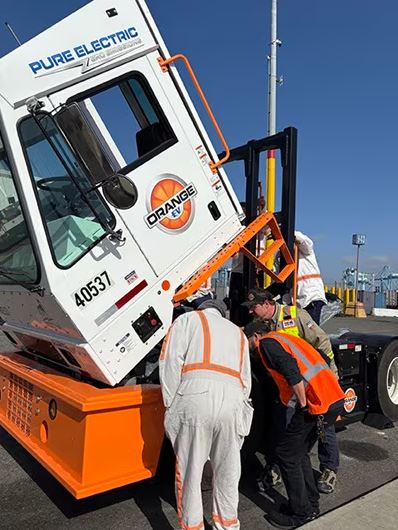 APM Terminals Pier 400 in Los Angeles has introduced the port's largest fleet of electric terminal tractors (ETTs), deploying 10 fully commissioned units with an additional 10 expected by the end of July, according to the company's release.
APM Terminals Pier 400 in Los Angeles has introduced the port's largest fleet of electric terminal tractors (ETTs), deploying 10 fully commissioned units with an additional 10 expected by the end of July, according to the company's release.
This initiative, in collaboration with electric vehicle manufacturer Orange EV and maintenance partner Pacific Crane Maintenance Company (PCMC), aims to replace nearly 30% of the terminal's diesel tractor fleet.
To ensure workforce readiness, 21 ILWU Local 13 union mechanics employed by PCMC underwent a three-day training program in mid-May, led by Orange EV technicians, covering safety protocols, diagnostics, and routine maintenance for the new electric tractors.
This training is part of a broader initiative to prepare the workforce for the evolving technological demands of terminal operations.
The Pacific Maritime Association (PMA) plans to expand this effort by instituting an electric tractor training program at the ILWU-PMA Maintenance & Repair Training Center.
Orange EV, based in Kansas City, manufactures the HUSK-e electric terminal tractors, which have been deployed in over 300 fleets across North America, accumulating more than 22.6 million miles and 8.3 million hours of operation.
The vehicles comply with Build America, Buy America standards and are supported through a domestic service and parts supply network.
APM Terminals is a global port operating company headquartered in The Hague, Netherlands, and a subsidiary of Danish shipping company A.P. Moller-Maersk. Founded in 2001, it manages container terminals and provides integrated cargo and inland services, operating 74 port and terminal facilities in 38 countries on five continents.
Orange EV, established in 2012 and based in Kansas City, Missouri, is a manufacturer of pure electric terminal trucks. The company pioneered the first commercially deployed 100% electric Class 8 terminal trucks in the United States. Since delivering its first terminal truck in 2015, Orange EV has deployed over 1,400 units to more than 300 fleets, accumulating over 22.6 million miles and 8.3 million hours of operation.



